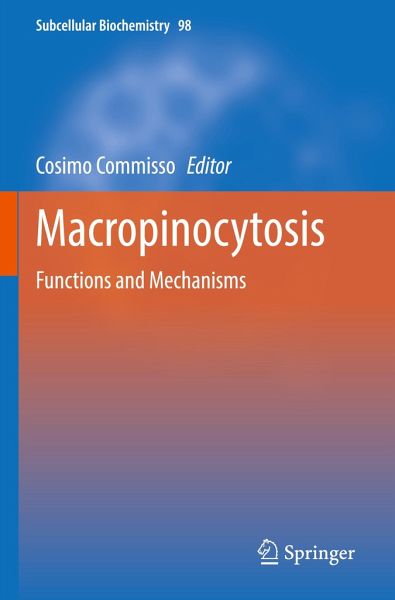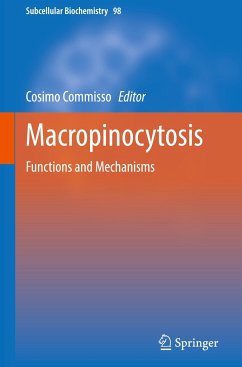
Macropinocytosis
Functions and Mechanisms
Herausgegeben: Commisso, Cosimo
Versandkostenfrei!
Versandfertig in 6-10 Tagen
121,99 €
inkl. MwSt.

PAYBACK Punkte
61 °P sammeln!
This book presents the functions and mechanisms of macropinocytosis, an actin-driven endocytic uptake process.Key points, including the evolutionary origins of macropinocytosis and major signaling pathways that regulate this uptake mechanism, are highlighted. A wide-array of functions of macropinocytosis are described, including cellular metabolism, cell death, cell migration and antigen presentation. Macropinocytosis has recently been recognized as a critical pathway in disease pathology and treatment. Therefore, a broad overview of macropinocytosis will benefit clinicians, as well as transla...
This book presents the functions and mechanisms of macropinocytosis, an actin-driven endocytic uptake process.
Key points, including the evolutionary origins of macropinocytosis and major signaling pathways that regulate this uptake mechanism, are highlighted. A wide-array of functions of macropinocytosis are described, including cellular metabolism, cell death, cell migration and antigen presentation. Macropinocytosis has recently been recognized as a critical pathway in disease pathology and treatment. Therefore, a broad overview of macropinocytosis will benefit clinicians, as well as translational and basic research scientists. Moreover, as one of the main clathrin-independent endocytic routes, compiling all the critical information about macropinocytosis in one collection, this book will also be helpful to educators and their students.
Key points, including the evolutionary origins of macropinocytosis and major signaling pathways that regulate this uptake mechanism, are highlighted. A wide-array of functions of macropinocytosis are described, including cellular metabolism, cell death, cell migration and antigen presentation. Macropinocytosis has recently been recognized as a critical pathway in disease pathology and treatment. Therefore, a broad overview of macropinocytosis will benefit clinicians, as well as translational and basic research scientists. Moreover, as one of the main clathrin-independent endocytic routes, compiling all the critical information about macropinocytosis in one collection, this book will also be helpful to educators and their students.














